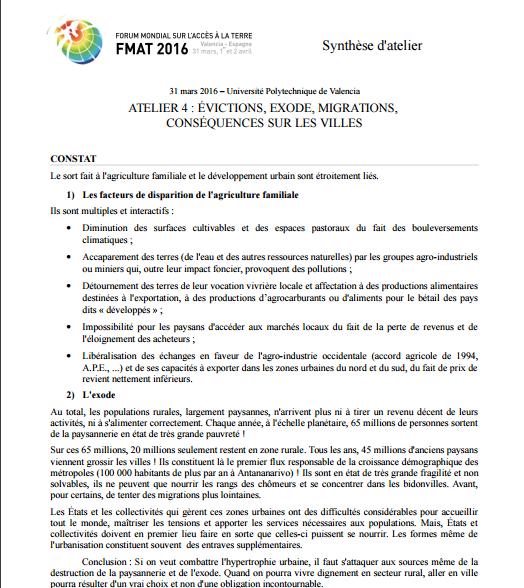Location
The goal of the WFAL 2016 had been to organise a world forum in 2016 to address the major issues linked to unequal access to land, natural resources (see The Call). Finally, the global assembly took place in Valencia, Spain (31st March, 1-2 April 2016) with more than 400 participants from 70 countries from today at the Global Forum on Access to Land and Natural Resources.
Ten years after the World Forum on Agrarian Reforms (Valencia, Spain, 2004) and the International Conference on Agrarian Reform and Rural Development (Porto Alegre, Brazil, 2006) the trends seemed unchanged if not worse.
Making a precise assessment of the situation had been imperative. An evaluation of the short and long terms consequences had been essential. It couldn’t must ignore none of the great economical, social, political and environmental prejudices due to the ongoing processes. It was the condition to identify responses able to solve the problems.
Implementing such an analysis had been possible according to the signatories of the WFAL 2016 Call, if citizens from every continent and the organizations in charge of representing or guaranteeing their interets could effectively debate into a structured and contradictory process: farmer and other civil society organisations, governmental organisations, indepedant or public research institutes.
The WFAL 2016 Call aimed at creating the conditions necessary for such a debate, with the guarantee that each one’s point of view and analysis had been taken into consideration by all, towards the invention of the most constructive proposals.
Members:
Resources
Displaying 6 - 10 of 25ATELIER 5 : LES DIFFICULTES D’ACCES DES FEMMES À LA TERRE ET AUX RESSOURCES NATURELLES
Partout dans le monde, l’immense majorité des femmes fait face à des conditions d’accès et de contrôle de la terre et des ressources naturelles inégales à celles des hommes.
ATELIER 4 : ÉVICTIONS, EXODE, MIGRATIONS, CONSÉQUENCES SUR LES VILLES
Le sort fait à l’agriculture familiale et le développement urbain sont étroitement liés.
WORKSHOP 7: ENVIRONMENT, AGRO-ECOLOGY, SOIL, WATER, CLIMATE CHANGE
The dominant agricultural model, based on the abusive and destructive use of natural resources, leads us into a health, social, ecological, climatic, economic and cultural impasse.
In the North as in the South a regulatory arsenal limits the rights of peasants to exchange and reproduce their seeds. The privatization of seeds, the first link in the food chain, and the growing control over them by multinational companies seeking to increase their monopoly by imposing hybrid seeds and GMOs poses a threat to global sovereignty and food security.
WORKSHOP 6: PRODUCTION, JOB CREATION, ESTABLISHMENT OF YOUNG FARMERS, WEALTH DISTRIBUTION
Processes of land grabbing and accumulation have greatly threatened small-scale family-based agriculture and societies overall. The destruction of small-scale agriculture can be attributed to national and international policies which actively support the development of a capitalist agriculture with employees.
WORKSHOP 5: THE DIFFICULTIES OF WOMEN’S ACCESS TO LAND AND NATURAL RESOURCES
Throughout the world, the vast majority of women are faced with conditions of access to land and control of land and natural resources that are unequal to those of men.
Social relations have trivialized the fact that they are entirely in charge of domestic work and the education of children, which prevents them from devoting themselves as much as men to agricultural activities. In the fields, they are the forced laborers of the family and take on the often less valued tasks, considered as part of their domestic obligations. As a result, they generally receive no income.



